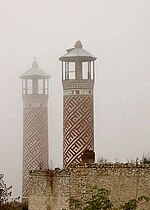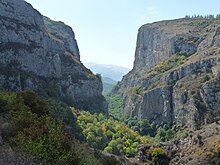
Shusha or Shushi is a city in Azerbaijan. This fortified city has long been a cultural center in Karabakh.
Understand
[edit]Shusha was an Azeri-majority city, albeit with a significant Armenian minority, before the 1990s when all of its original Azeri population was expelled or killed following the First Nagorno-Karabakh war. After the war, the city was under the ethnic Armenian Nagorno-Karabakh Republic and was partly rehabilitated. Following the city's recapture by Azerbaijan during the Second Nagorno-Karabakh War in 2020, large scale reconstruction work is ongoing to revive the destroyed city as the capital of Azerbaijani art, poetry, and music as it once was.
Get in
[edit]As of 2021, it is no longer possible to reach Shusha from Armenia or Stepanakert.
As of Aug 2022, visits from the rest of Azerbaijan are reportedly possible only as part of a group with a permit.
By bus
[edit]
By thumb
[edit]By taxi
[edit]Get around
[edit]It is easy enough to walk around Shushi. The streets of the lower part of the town are not yet paved. Therefore, expect a lot of mud if it is wet.
Taxis are usually available in the area near and east of Ghazanchetsots Cathedral.
See
[edit]

- 1 Ghazanchetsots Cathedral. Armenian cathedral consisting of a church and a bell tower. It was built in the second half of the 19th century, and used to be the largest Armenian church. It was in use till the Shusha massacre in 1920, and then was used as a barn. It was restored in 1998. Interior decoration is quite modest, which is traditional for Armenian churches.
- 2 Govhar Agha Mosque. Construction of the mosque was started in 1768 by Ibrahim Khan and then was frozen for years until Gevhar-aga, the successor of Ibrahim Khan, completed it. The inner space of the mosque is not much different from other places of worship in Karabakh of that period. There is a two-story gallery, separated by high stone pillars, as well as traditional domed ceilings. The mosque was heavily damaged in 1992, but in 2007 and 2011 it was completely reconstructed. You can enjoy the building from outside, but it doesn't function as a mosque anymore.
- 3 Lower Mosque (around the corner of Govheraga Mosque). Some ruins that still have their towers partly intact and which allow for a great view of the surrounding area. However, they are ruins, so be cautious.
- 4 Shusha fortress. Fortress built in 1752 by Khan Panah Ali Bey to defend the northern part of the plateau, as it is geographically the most vulnerable part of the city. Fortress walls are 2.5 km long. There is also a secret exit from the fortress, leading to the gorge Karin-so. There were 3 gates: north, west and east.
- 5 Town Walls. This is where one of the old gates is in the town walls.
- 6 Shushi History Museum, 32, M. Mashtots, ☏ +374 47 73 19 48. M-Sa 09:00 - 17:00. It demonstrates the rich archaeological finds of the Hellenistic period along with ethnographic items of the 19th century. Also one can find here a diorama of the Shushi battle. Free admission.
- 7 Kanach Zham church (slightly uphill from the Ghazanchetsots Cathedral). Armenian Apostolic Church whose name translates from Armenian as "Green Church", as its domes were painted green long ago. The church was built in 1818 at the place of the former Gharabaghtsots wooden one. Nowadays, the chapel features some unique interior decoration.
- 8 Vagif Mausoleum (Vaqif türbəsi). An impressive, 1970s (Soviet)-built monument to Molla Panah Vagif, an 18th-century poet and statesman of the Karabakh Khanate. It was seriously derelict during the almost three decades of Armenian rule, but was restored in 2021, after the Azerbaijani retook the city.
- 9 Jidir Plain (Cıdır düzü) (just over Vagif Mausoleum). A plateau where horse races, wrestling tournaments, and Novruz (Persian New Year) celebrations were held during the days of the Karabakh Khanate. This is a famous lookout offering a spectacular view of the scenic, craggy Dashalty (Qarqar) gorge 200 m below, as well as glimpses of the Karabakh capital Stepanakert, Xankəndi ("khan's city") to the Azerbaijanis — it's less than 10 km distant from here as the crow flies, but getting there since the 2020 war entails embarking on a roundabout trip of about a thousand kilometres crossing at least three borders and an unspecified number of checkpoints.
Outside the city
[edit]- 10 Zontik Waterfall (follow direction of Janapar Trail either from Shushi or Karintak to reach it). Beautiful huge umbrella of moss, covered with dripping water, with a space under it is appropriately named Zontik - or umbrella. Beautifully sited right above the Karkar River, under the cliffs. Only accessible by hiking in.
Do
[edit]- Drama theater.
- Art gallery, Ghazanchetsots str., ☏ +374 97 24 69 62, gasparyanlusine79@gmail.com. Exhibits works of Martiros Saryan, Pavel Kuznetsov, Minas, N. Nikoghosyan, Zhilinskiy, Safohin, Gayane Tiflisetsi, Yuri Grigoryan, Hakob Hakobyan, Galents and other prominent artists.
- 1 Trailhead to Karintak. Marked trail down into Karkar canyon, to Zontik waterfall and Karintak village.
- 2 Trailhead to Stepanakert. Janapar trail to Stepanakert.
Buy
[edit]Eat
[edit]
Drink
[edit]Sleep
[edit]B&B and homestays
[edit]- Armen and Christina's B&B, 9/35 Aram Manukian Street (in the house at the corner of the intercity marshrutka station, ask for Frantsatsi Armeni Tun), ☏ +374 97330974, +374 47731230, +374 97240712.
- Bella, ☏ +374 97 731175, +374 97211727 (Oxanna). 4-5 beds.
- Mkhitar and Armine, ☏ +374 97272922, +374 97731910, Michael.com@mail.ru. 4 beds.
- Saro (at the edge of town).
Hotels
[edit]
- 1 Shushi Grand Hotel, ☏ +374 47-949400. Very comfortable western hotel with great food, totally rebuilt to purpose. A bit off center.
- 2 Avan Shushi Plaza Hotel, ☏ +374 47-949400. Renovated high-rise Soviet hotel in the center of Shushi. Smaller rooms often with good views.
- 3 Shushi Hotel, ☏ +374 47-949400. Small hotel right above the main cathedral.
Go next
[edit]


